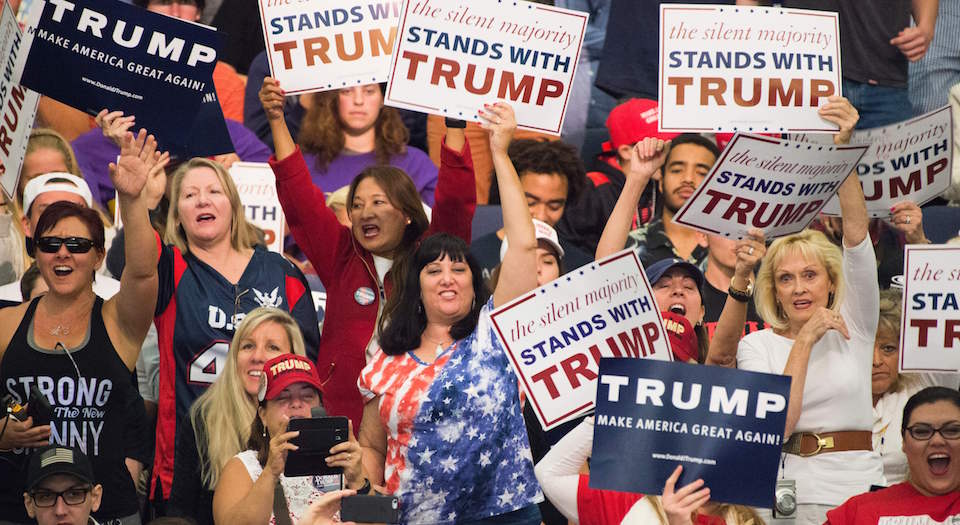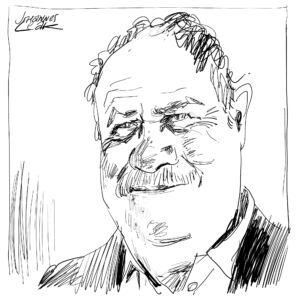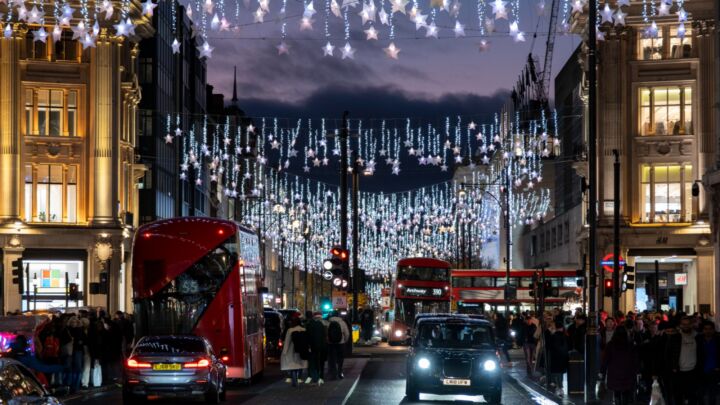
Long-read
The new culture war dividing America
Underpinning the progressive elite's snobbery is a vicious class antagonism.
Want unlimited, ad-free access? Become a spiked supporter.
The stirring speech made by the openly gay tech billionaire Peter Thiel at the Republican National Convention in Cleveland marked a critical change in the nature of the Culture Wars in the US. Rather than boo him for talking about his sexuality, or using it as a convenient opportunity for indulging in prayer, the sometimes less than gay-friendly GOP greeted his affirmation of his ‘proud’ sexuality with cheers, not jeers.
Thus, in 2016, in Cleveland, died America’s decades-long Culture Wars, which revolved largely around issues such as gay marriage, abortion and prayer in school. Despite his many outrages, Donald Trump, through his identification with figures such as Thiel, has buried the old cultural conservatism, along with its last standard bearer, Texas senator Ted Cruz, whose grandstanding non-endorsement of Trump at the convention may well consign him to the GOP’s fringe.
Trump, or perhaps more accurately his 13million primary voters, has improvised a new right-wing programme that emphasises economic nationalism, nativism and opposition to all things politically correct. Some pockets of the traditional right, horrified by Trump’s open hedonism and lack of grace, will no doubt resist this shift away from piety, but most of Middle America – the vast populace of the ‘flyover’ states, small towns and less-than-tony suburbs – seems to have moved on.
Redefining the Culture Wars into class war
Two developments have driven this change. One is an overall decline of religiosity among America’s working and middle classes. Concentrations of evangelicals in places like Iowa helped Cruz and sustained some of his better showings in the Deep South, but, overall, even in the heart of the so-called Bible Belt, the self-proclaimed prophet of the righteous proved no match for the raw nationalism of Trump.
Despite the hysteria its members evoke among progressives, the religious right has been in, to coin a phrase, secular decline since the year 2000. The legions of evangelicals have stopped growing, even as mainstream Protestants, in particular, have lost ground. The big growth now is among the unaffiliated, whose numbers rose from 37.6million to 57million between 2007 and 2014.
Trump – a thrice-married mainstream Presbyterian with little apparent knowledge of the Bible – benefited from this decline. He was rightly seen by Republican voters as the least religious of the major candidates, yet he outperformed the surgeon Ben Carson and the theocrat Cruz even among evangelicals.
Class seems to have won over piety. The white working and lower-middle classes, the most heavily attracted to Trump’s message, are themselves increasingly irreligious. They are now coping with many of the predicaments – out-of-wedlock births, drug abuse, marginal employment – long endured in minority communities. Of all American groups, they are the ones afflicted both by shorter lifespans and rising rates of suicide. As Pittsburgh psychologist Kenneth Thompson, who treats both white and black working-class patients, puts it: ‘Their social habitat is strained, and the strain is showing up in a looming body count.’
Faced with these grim trends, Middle Americans – particularly in the old factory towns of the Midwest and the Southeast – have stopped looking for God to save their communities. Instead they want someone like Trump, who promises, however cynically, to return good-paying middle-class jobs and block new trade deals. If the labour market can be improved by cutting off the flow of undocumented workers, much of Middle America is more than okay with that.
The war against ‘The Stupid’
Class increasingly defines America’s new Culture Wars, pitting the rising power of well-educated, and self-regarding, supermen (or should I say super-people), against those they regard as less cognitively gifted. This clerisy – the media, academia, the well-funded progressive non-profits – is now waging what the Atlantic recently called ‘a war on stupid people’, which, of course, extends particularly to those who back the loutish Trump. As a group, this educated caste shares increasingly uniformly progressive social views and are almost 50 per cent more likely to be Democrats than Republicans.
There are good reasons for the new cognitive class to like the progressive status quo. Along with the corporate aristocracy who fund the Democratic Party, the hyper-educated have thrived under Obama. In contrast, the bulk of the working and middle class have seen their incomes stagnate or decline.
The new class has little stake in the traditional economy – agribusiness, energy, manufacturing, suburban home-building – that has traditionally provided decent employment to the working and middle classes. Some among them, notably the environmental zealots, even decry rising living standards for ordinary Americans as the primary threat to the environment. The entire progressive agenda increasingly constitutes an attempt to drive poverty out of the centre of cities and into the middle class. And in Trumpian fashion, they want to make the middle class, with their tax dollars, pay for the privilege.
Race, national identity and the American future
Trump’s emergence has benefited from worsening race relations, as sadly demonstrated in the recent rash of cop killings. The terrorist attacks mounted primarily by young Muslims both here and in Europe, and a rise in violent crime, have contributed to the Trump campaign and could still make his victory, however unlikely, possible.
The mass migration of largely undocumented poor people from developing countries – mainly Mexico and Latin America – is also less than welcomed by working- and middle-class people, who not only have to accommodate the newcomers in their schools and neighbourhoods, but must also compete with them for jobs. In contrast, the upper classes in tony suburbs or prime urban districts see immigration as all good – it supplies them with cheap household labour, better restaurants and it injects some ‘colour’ into otherwise predictably dull commercial districts.
Nor has the progressive left done much to promote tolerance. The very premise of movements like Black Lives Matter implies that other lives, including those of police, are less important. The overwhelming white cognitive elite dismisses the legitimate concerns of the white working class and sees only unreconstructed racism.
This contempt spills into a growing dispute about the validity of America’s traditional culture. Now denounced for its past racism, it is rarely celebrated for its continuing success at integration. Globalist progressivism is so deeply entrenched in blue lagoons like Silicon Valley, it’s doubtful the oligarchs in charge even notice. Google, for example, recently celebrated the life of the radical pro-Bin Laden activist Yuri Kochiyama, but saw fit to ignore the anniversary of D-Day. Facebook and Twitter now increasingly curate the news like 19th-century Boston Brahmins, usually with a decidedly progressive bias.
Populism after Trump
In his Cleveland speech, Thiel pointed to what should really matter – issues of community, of economic opportunity and, yes, pride in being a citizen of the most powerful republic in world history. Many in Silicon Valley and the media prefer that the big issues are those of gender, race and sexual preference. But Thiel rightly consigned them to secondary importance, saying: ‘Now we are told that the great debate is about who gets to use which bathroom. This is a distraction from our real problems. Who cares?’
Trump sees this, too. He, at the very least, talks about sparking economic growth, which is a precursor to upward mobility. In contrast, the contemporary Democratic Party, notes former Bill Clinton adviser Bill Galston, now displays ‘near-silence on economic growth’.
Some right-wingers believe that Trump can win the presidency purely as the candidate of resentment. But his stridency, racial innuendos, lack of respect for basic decencies, and often unsupported claims are more likely to alienate voters – particularly suburbanites and middle-class minorities, who might have otherwise rallied to his standard.
Given its almost lock-step media backing, support from oligarchs everywhere, and Trump’s self-destructive lack of self-control, the Democratic establishment will likely prevail at the election. And it will use this as a perfect opportunity to turn more Americans into effective wards of the state. It will finance its agenda at the cost of the middle class while the hedge funders, tech oligarchs and real-estate speculators continue to feed at the trough.
However, the forces stirred up and tapped by Trump will not go away anytime soon, even if he loses. What the rebellion now needs, more than anything, is a messenger like Ronald Reagan in 1980, who appealed to earlier resentments but with a fierce sense of discipline and decorum. Some day, the swagger, arrogance and manipulation of the united ruling classes may have to confront a messenger who, unlike Trump, can make a more convincing case against them. Those who laugh today at Trump and his ‘stupid’ supporters may not be so jocular that day.
Joel Kotkin is presidential fellow in urban futures at Chapman University and executive director of the Houston-based Center for Opportunity Urbanism. He is the author most recently of The Human City: Humanism for the Rest of Us, published by Agate B2. (Buy this book from Amazon(US).)
Picture by: Getty Images.
£1 a month for 3 months
You’ve hit your monthly free article limit.
Support spiked and get unlimited access.
Support spiked – £1 a month for 3 months
spiked is funded by readers like you. Only 0.1% of regular readers currently support us. If just 1% did, we could grow our team and step up the fight for free speech and democracy.
Become a spiked supporter and enjoy unlimited, ad-free access, bonus content and exclusive events – while helping to keep independent journalism alive.
———————————————————————————————————————————–
Exclusive January offer: join today for £1 a month for 3 months. Then £5 a month, cancel anytime.
———————————————————————————————————————————–
Monthly support makes the biggest difference. Thank you.







Comments
Want to join the conversation?
Only spiked supporters and patrons, who donate regularly to us, can comment on our articles.